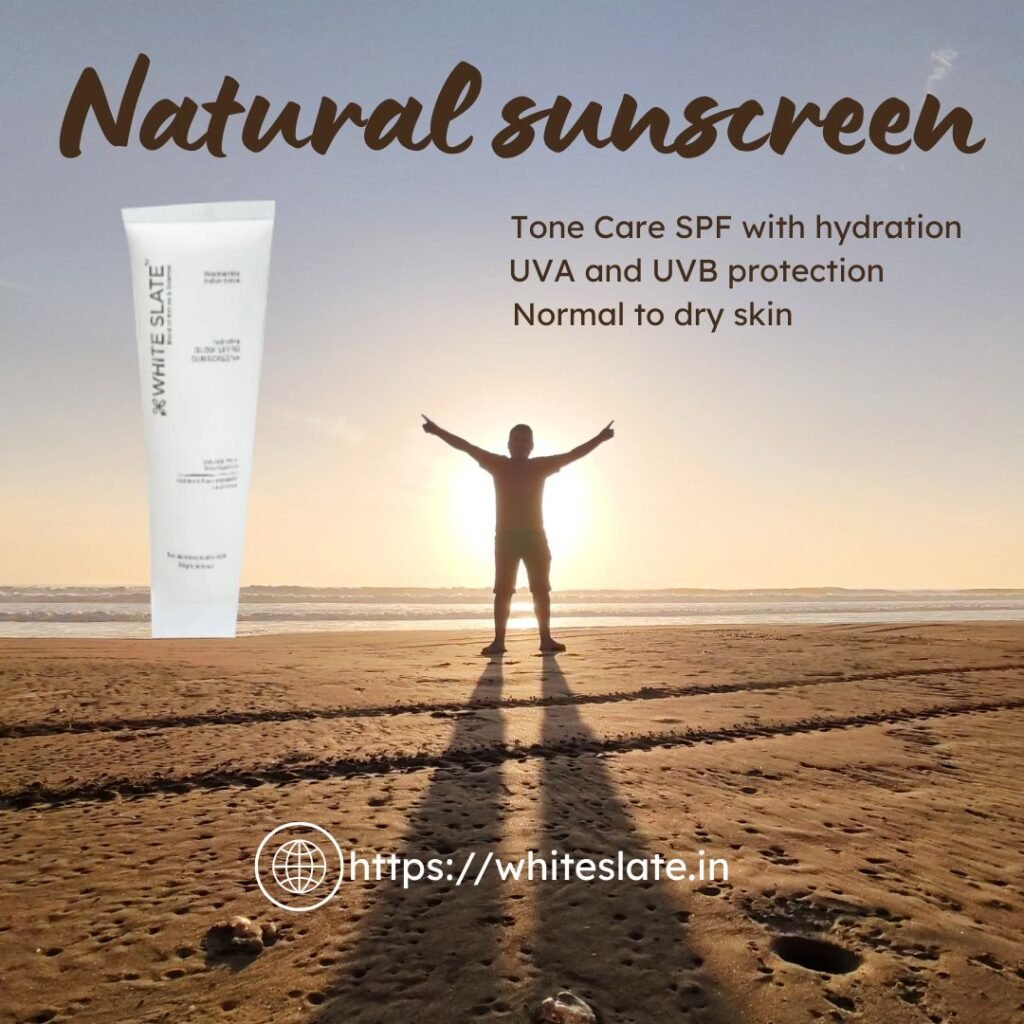
In our quest to protect our skin from the sun’s harsh rays, many of us turn to traditional sunscreens filled with synthetic chemicals. While they may be effective, concerns about potential side effects and environmental harm have led to a growing demand for natural sunscreen. These eco-friendly alternatives not only shield your skin from UV radiation but also nurture it with ingredients derived from nature.
Natural sunscreen refers to sun protection products made primarily from mineral-based ingredients and plant-derived compounds. Unlike chemical sunscreens that absorb UV rays through synthetic compounds, natural or mineral sunscreens rely on ingredients like zinc oxide and titanium dioxide to create a physical barrier that reflects ultraviolet radiation away from the skin.
Natural sunscreens often blend these minerals with nourishing oils and botanical extracts, resulting in a product that provides broad-spectrum protection without irritating the skin or harming marine life.
Natural sunscreen work by sitting on the surface of your skin rather than penetrating it. The main active minerals, zinc oxide and titanium dioxide, act as reflectors that block UVA and UVB rays. This physical defense starts working immediately after application, unlike chemical options that need up to 30 minutes to activate.
In addition to physical blocking, natural sunscreen formulas are often enriched with antioxidants like vitamin E, green tea extract, or raspberry seed oil. These ingredients help neutralize free radicals produced by sun exposure, offering an extra layer of protection against premature aging and cellular damage.
Key Ingredients in Natural Sunscreen
When choosing a natural sunscreen, it’s important to understand its core components. Look for products that list the following ingredients:
- Zinc Oxide: Offers broad-spectrum protection and is gentle on sensitive skin.
- Titanium Dioxide: Helps reflect UV rays while maintaining a light texture.
- Coconut Oil: Acts as a natural moisturizer and adds water resistance.
- Shea Butter: Nourishes and soothes the skin.
- Aloe Vera: Provides a soothing effect, ideal for sun-exposed skin.
- Raspberry Seed Oil: Known for its natural SPF properties and rich antioxidants.
- Green Tea Extract: Reduces inflammation and protects against oxidative stress.
These ingredients combine to create a sunscreen that is non-toxic, biodegradable, and safe for both the body and the planet.
Benefits of Using Natural Sunscreen
Natural sunscreen offers several benefits beyond simple UV protection.
- Non-toxic and Safe: Free from oxybenzone, avobenzone, and other chemical agents often linked to skin irritation and hormonal disruption.
- Eco-friendly: Mineral sunscreens do not contribute to coral reef bleaching, making them safe for marine ecosystems.
- Gentle for Sensitive Skin: The mineral and botanical base reduces the risk of allergic reactions.
- Instant Protection: Works immediately after application without waiting time.
- Anti-aging Properties: Rich in antioxidants that help prevent wrinkles and sunspots.
Regular use of a natural sunscreen encourages healthier, more balanced skin without exposure to harmful synthetic chemicals.
Choosing the Right Natural Sunscreen
With the variety of Natural sunscreens available, selecting the right one depends on your skin type, activity level, and coverage needs.
For sensitive skin, choose a fragrance-free natural sunscreen with zinc oxide as the sole active ingredient. If you spend extended periods outdoors, look for water-resistant options blended with coconut oil or shea butter. For daily use, a lightweight, tinted natural sunscreen provides protection while giving your skin an even tone.
How to Apply Natural Sunscreen Properly
Even the best natural sunscreen won’t work effectively if applied incorrectly. Follow these steps for optimal protection:
- Apply sunscreen at least 15 minutes before sun exposure, ensuring an even layer over all exposed skin.
- Reapply every two hours or immediately after swimming, sweating, or towel drying.
- Don’t forget common spots like the ears, neck, tops of feet, and hands.
- For the face, use a cream or lotion specifically formulated for facial skin to avoid clogged pores.
Consistency is key. Daily protection with a Natural sunscreen can prevent sun damage even on cloudy days when UV rays are still active.
The Environmental Impact of Natural Sunscreens
Choosing natural sunscreen isn’t just good for your skin—it’s also good for the planet. Chemical sunscreens often contain ingredients that wash off into oceans and damage coral reefs. Natural formulations made from zinc oxide and plant oils are biodegradable and harmless to aquatic life.
Moreover, eco-conscious brands package their natural sunscreens in recyclable or compostable containers, further reducing environmental footprints. By switching to natural sunscreen, you help preserve marine biodiversity while maintaining your sun safety.
Natural sunscreen represents the perfect balance between skin care and environmental responsibility. It harnesses the power of minerals and botanicals to offer effective, safe, and eco-friendly sun protection. Whether you’re spending a day at the beach or going about your daily routine, incorporating natural sunscreen into your skincare regimen ensures long-term health for your skin and the planet.



